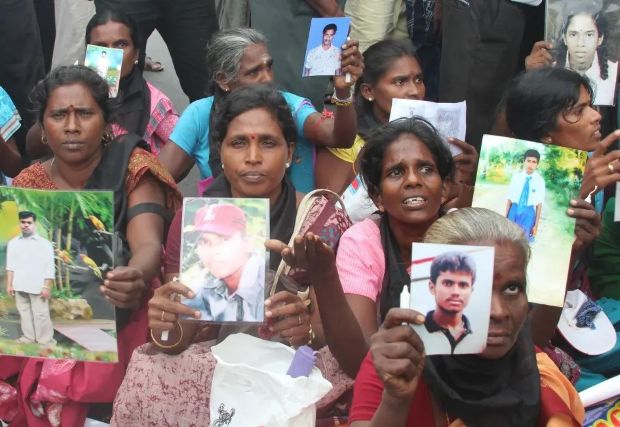Sri Lanka on the front line of battle for accountability
By Meenakshi Ganguly
For many people around the world, the memory of atrocities that shocked us is often overwritten a few years later by new horrors. But for survivors and the families of victims, the suffering never ends. Worse still, military and political leaders elsewhere — who might be considering atrocities of their own — are paying close attention. Unaddressed war crimes provide a dismal model for future atrocities.
Sri Lanka’s total defeat of the separatist Liberation Tigers of Tamil Eelam (LTTE) in 2009, which cost tens of thousands of civilian lives, in what the United Nations found may constitute crimes against humanity, demonstrated utter disregard for the laws of war by both sides. Yet it is held up today by some Israeli military strategists as a campaign to be emulated. That is only possible because there were no consequences for the atrocities committed.
Successive Sri Lankan governments have shown that by pledging to uphold international law and then reneging on that promise, you can get away with anything. That’s why the UN Human Rights Council needs to keep demanding accountability and renew the mandate to collect evidence of international crimes committed in Sri Lanka at its current session this month in Geneva.
Sri Lanka’s civil war lasted 26 years, with both sides committing widespread violations, including attacks on civilians, extra-judicial killings, and enforced disappearances. In the final months of the war, the remnants of the LTTE and hundreds of thousands of Tamil civilians were corralled by the Sri Lankan army in an ever-shrinking space.
While the LTTE used the civilians as human shields, the Sri Lankan army blocked humanitarian supplies and unilaterally declared one “safe zone” after another, before bombarding those same areas with airpower and artillery. Health facilities were repeatedly targeted. What happened in Sri Lanka 16 years ago, and went unpunished, were precursors to some of the tactics and abuses being used in Gaza today.
By 2009, Sri Lanka already had a long history of atrocities going unpunished. In the 1980s, a leftist uprising by the Janatha Vimukthi Peramuna (People’s Liberation Front, or JVP) led to the enforced disappearance and killing by the army of thousands of young people suspected of links to the insurgents. Some of the army officers involved in that campaign, such as Gotabaya Rajapaksa, who went on to become defence secretary and later president, would be implicated in later atrocities.
About 20 mass graves have been discovered so far around Sri Lanka, relating to both the JVP uprising and the civil war with the LTTE. Typically, they are uncovered by accident by construction workers, digging a foundation or laying a water pipe. The most recent mass grave to be reopened is at Chemmani, near Jaffna, in northern Sri Lanka, where the remains of over 200 people who are believed to have been killed in army custody in the 1990s were discovered this year, including a child with a school bag.
Victims’ families and human rights defenders at Chemmani, and throughout Sri Lanka, hope that the remains will be identified, the truth will be revealed, and those responsible held to account. But bitter experience gives them few grounds to be hopeful. Due to a lack of technical capacity or political will, no mass grave in Sri Lanka has yet been successfully investigated.
The families of the “disappeared” have been waiting for decades to learn what happened to their loved ones, much less see justice done. Those who campaign for answers face surveillance and intimidation from the security forces. A woman whose son was taken away by the army in 2008 and never came home told Human Rights Watch this summer that she had recently been questioned for three hours by counterterrorism police. “Sometimes they approach our children to get information about us. That is a type of threat,” she said.
The blanket impunity for international crimes, and flagrant harassment of people who demand justice, have led victims to lose faith in domestic mechanisms. UN action to uphold international law in Sri Lanka is essential. Since 2015, the UN Human Rights Council has passed a series of resolutions to support accountability. At first, Sri Lanka supported those resolutions, though the government did not fulfil its commitments. But in 2020, Sri Lanka withdrew from the process, preferring to uphold “war heroes” rather than hold alleged criminals accountable.
The Human Rights Council responded by creating the Sri Lanka Accountability Project, to collect evidence of international crimes committed in Sri Lanka that could be used to prosecute alleged perpetrators abroad or, if conditions improve in Sri Lanka, to support future prosecutions in Sri Lankan courts. The council also mandated the UN to monitor ongoing abuses.
That work remains vital – not just to protect human rights in Sri Lanka, but to challenge impunity everywhere. Without accountability, brutal military and political leaders across the world will conclude that to achieve their ends, mass slaughter “works.”
– Meenakshi Ganguly is deputy director of Human Rights Watch’s Asia Division, overseeing the work in a number of countries in the region



Comments are closed, but trackbacks and pingbacks are open.